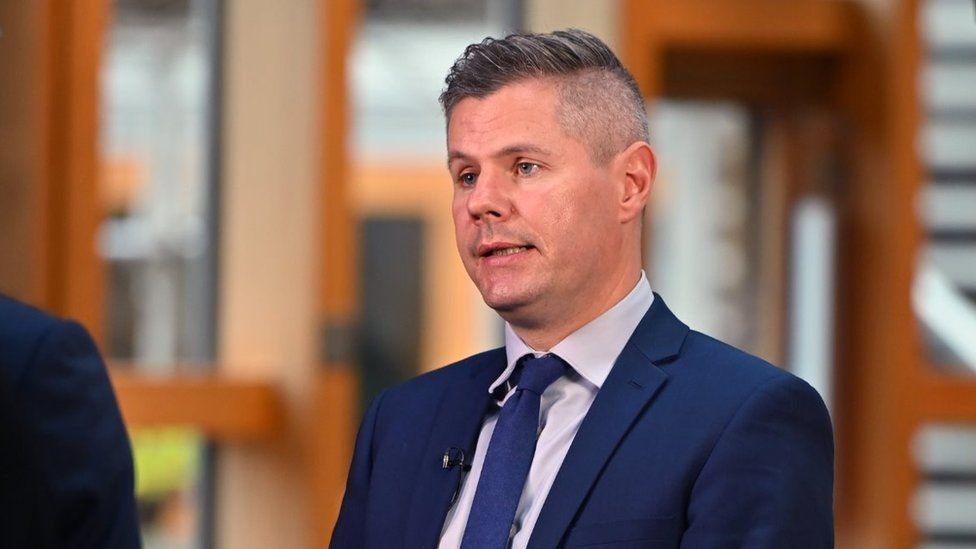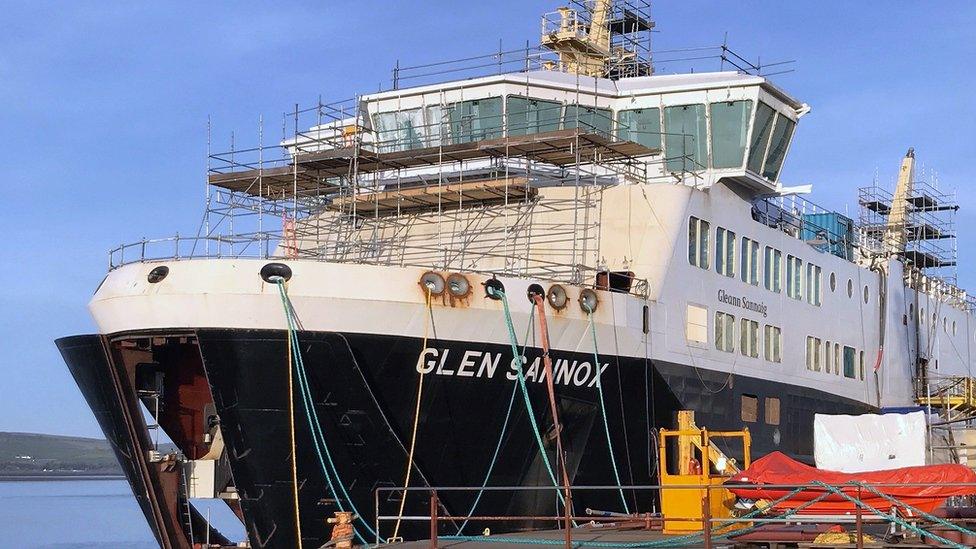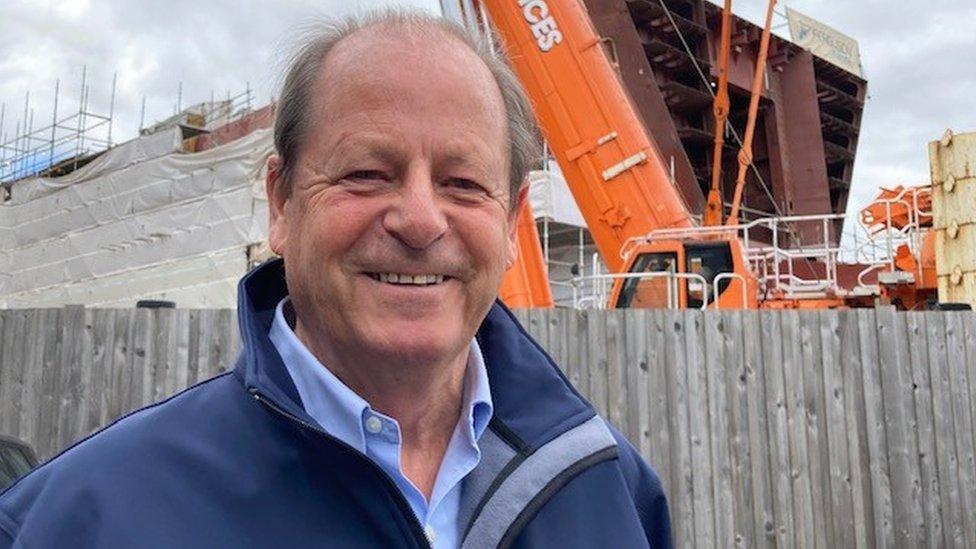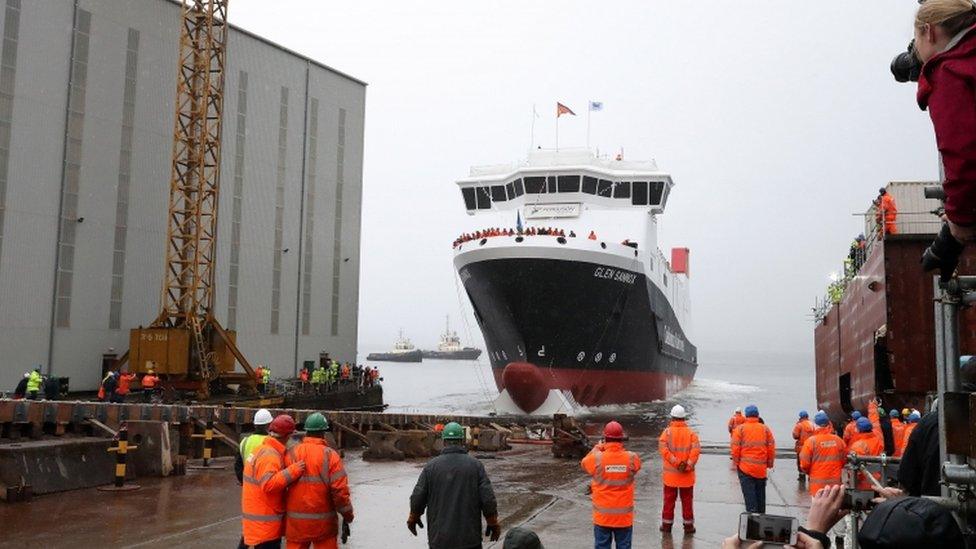Ex-minister Derek Mackay accepts role in 'catastrophic' ferries failure
- Published
Mr Mackay said that the responsibility did not all rest on him
Former minister Derek MacKay said he takes his share of responsibility for the failure to deliver two ferries for Calmac's west coast routes.
The former MSP was speaking to Holyrood's Public Audit Committee which is looking at why the vessels are years late and over budget.
He denied that the contract was awarded to Port Glasgow-based Ferguson shipyard for political reasons.
Mr Mackay resigned in 2020 amid a scandal over messages to a teenage boy.
Holyrood is holding an inquiry into delays and overspends at Ferguson Marine, which is still building the two ferries.
The Glen Sannox and as-yet-unnamed 802 will be at least five years late when they finally come into service.
Costs have risen hugely from £97m to £250m.
There are questions over why the contract was awarded to Ferguson Marine despite concerns over its suitability.
These were raised by CMAL (Caledonian Maritime Assets Limited), which buys ferries for ferry operator CalMac. Both organisations are owned by the Scottish government.

Anyone who hoped for a "mea culpa" from Derek Mackay will be disappointed.
There was no abject apology for the ferry fiasco.
No finger pointed at Nicola Sturgeon or his erstwhile colleagues in the SNP.
Instead the former transport minister was right on message.
"I'll take my share of responsibility", he said at the outset.
But for the next hour, he made clear his view that he'd done nothing wrong.
The contract for the two failed ferries was awarded without a "Builder's Refund Guarantee", which would have protected taxpayers' money if the whole project failed, ran late or went over budget.
But Mr Mackay insisted this wasn't his choice.
Instead, he claimed officials asked for authorisation to proceed with the contract - and spelled out ways in which the risks were reduced.
There was "regretability", he said, that the ferries hadn't been delivered.
Everyone agrees on that.
But his evidence suggests the needs of Ferguson shipyard and its workforce may have been put ahead of the people who matter more.
That's the residents of island communities, who're still waiting for their lifeline ferries.

'Methodical approach'
Mr Mackay had not been seen in the Scottish Parliament since he stood down as finance secretary and resigned from the SNP more than two years ago. He finally left Holyrood at last year's election.
Appearing before the Public Audit Committee, Mr Mackay said: "I recognise the catastrophic failure at Fergusons to complete the vessels on time and on budget. That is deeply regrettable.
"What I don't regret is protecting the workforce."
The former transport minister said he did not think there was a political agenda, or that the decision was rushed at all.
There was a "methodical approach" to procurement, he said.
"I recognise the failure of it but it was made with the best of intentions," he said. The decision was about "getting the vessels built in Scotland and ensuring the future of the yard", Mr Mackay said.
He told the committee that ministers "don't ordinarily sign contracts" and it would have been officials from CMAL - who led the procurement process - who physically signed off the contract.
Earlier this year, an Audit Scotland report highlighted how the deal was approved by ministers in 2015 without the normal financial safeguards being in place.
Mr Mackay said that "of course" he was concerned about an initial lack of a Builder's Refund Guarantee (BRG) but there was mitigation in the submission to him, with reassurances.
"I considered the advice, I was satisfied with the advice, therefore I informed my private office to proceed," he added.
Mr Mackay recalled that one of the key comments in the submission was that Ferguson's was the "best deal that could be negotiated" and that the yard had a "track record of delivery".
The former minister left the committee room through an alternative exit, avoiding waiting journalists.
Committee convener Richard Leonard later said the hearing brought clarity to some central issues but there were still major differences in the versions of events stretching back to February 2015.
He said: "We have today decided to invite the first minister to give evidence at a future meeting to help us get to the bottom of what has gone badly wrong with the delivery of ferries 801 and 802 for the Clyde and Hebrides.
"We will also consider any further next steps necessary to be able to report to parliament on our findings."
- Published24 June 2022

- Published3 April 2022

- Published26 April 2022

- Published15 July 2022
